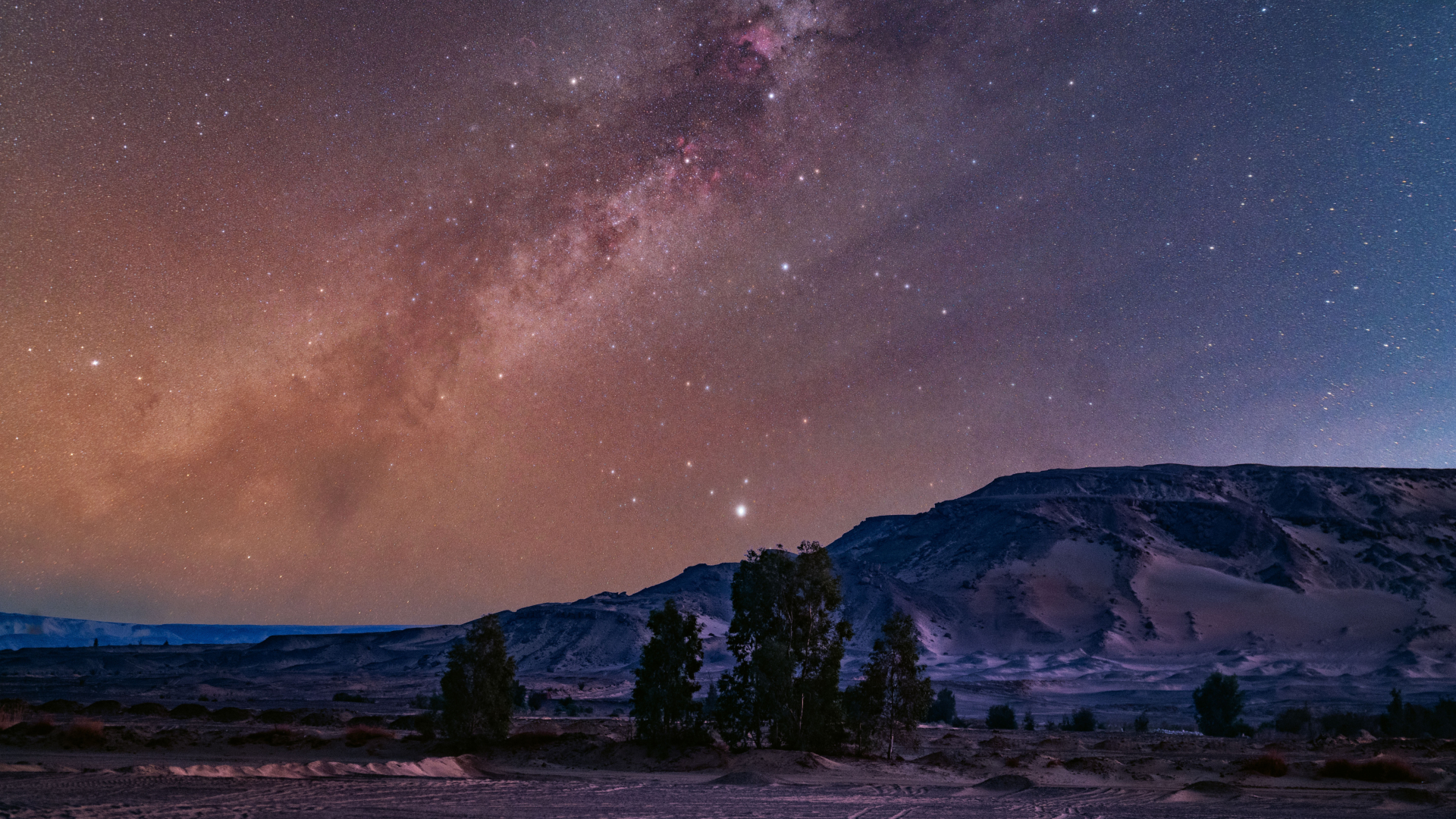Best night vision binoculars 2026: See in the dark and get a better look at the night sky
The best night vision binoculars range from basic infrared models to quality binoculars that will last a lifetime.
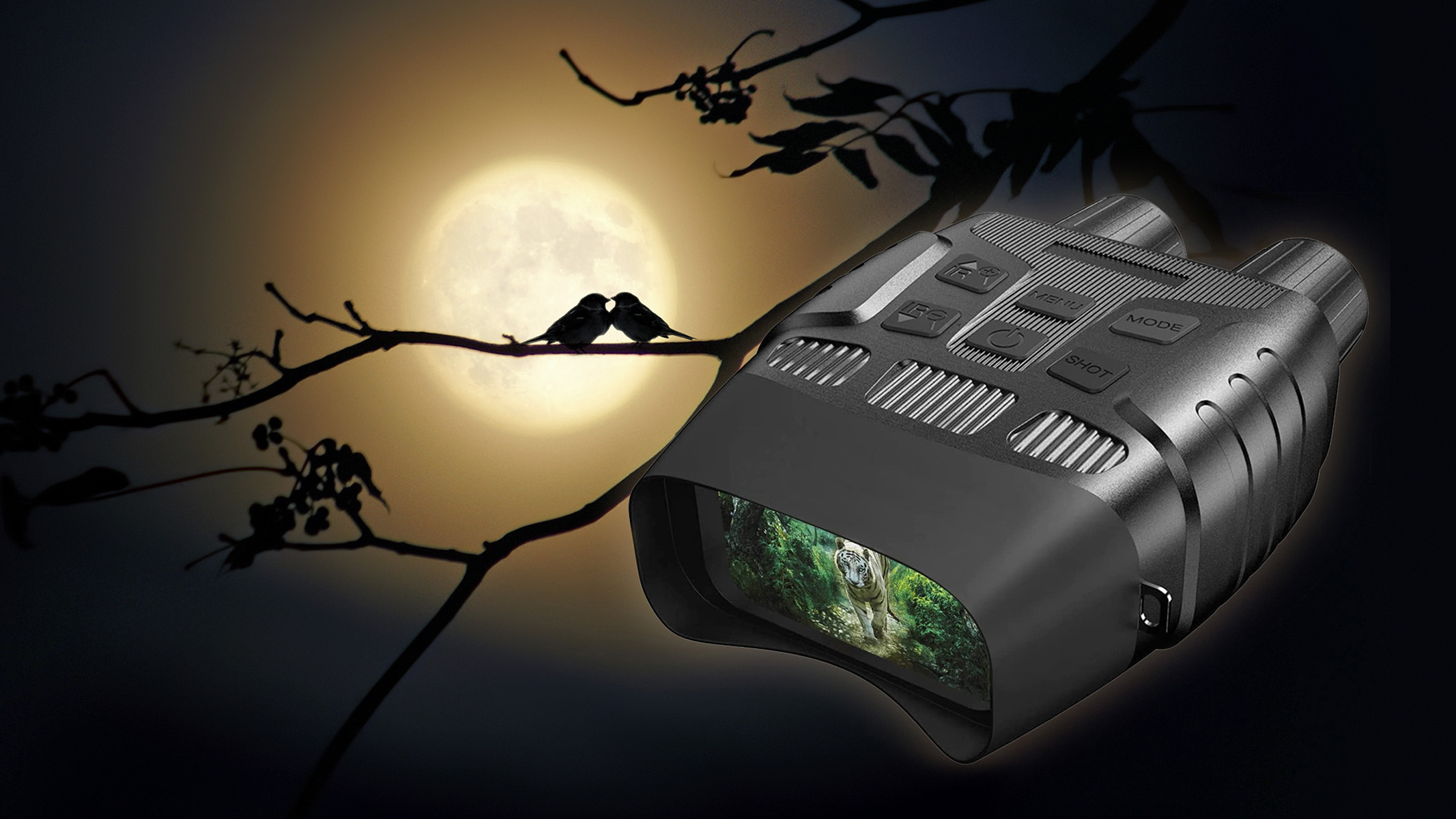
The best night vision binoculars can cut through the dark, perfect for stargazing, wildlife watching or just exploring low-light areas. And while once they seemed like the stuff of spy fiction, they're more affordable than ever. That's why we have rounded up the best night vision binoculars to suit a range of budgets and purposes.
If you're looking for binoculars without night vision, head over to our best binoculars or best compact binoculars guides instead. If you are wondering what you can see in the night sky with your new optics, our new skywatching highlights section gives you our top three recommended observations for this month with night vision binoculars. Our up-to-date night sky guide gives you a detailed lowdown of all the wonders you can see in the sky tonight and for the whole month ahead.
Best Night Vision Binoculars we recommend in 2026
Why you can trust Space.com
The best night vision binoculars overall
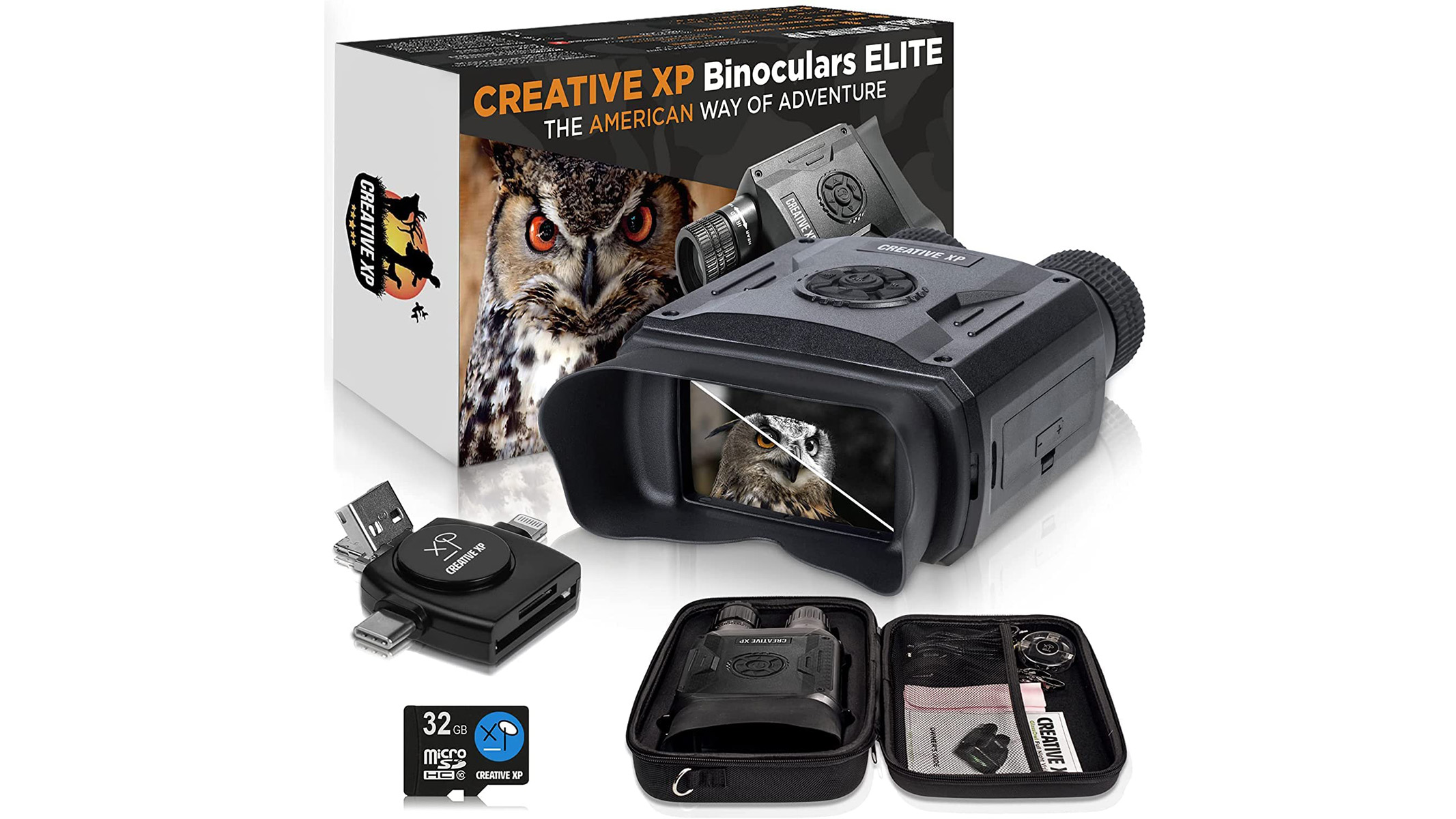
Creative XP Night vision Goggles Elite
Our expert review:
Specifications
Reasons to buy
Reasons to avoid
✅ You want to see far into the distance: The Creative XP Night Vision Goggles Elite have a huge viewing range of 1640 ft.
✅ You want something that's tripod compatible: Give your arms a break during longer sessions by mounting them on a tripod.
✅ You want to be able to record video: These binoculars can record video, and they come with a 128GB memory card.
❌ You're just curious about your backyard wildlife: There are plenty of other models that would be perfectly adequate for backyard wildlife spotting for a fraction of the price.
🔎 Creative XP Night Vision Goggles Elite: Though fairly expensive, we think these are the best night vision goggles on the market at the moment with their long viewing range, tripod compatibility and video recording capability. ★★★★½
The Creative XP Night Vision Googles have been on the market for three years but their versatility and incredible functionality make them a shade stronger than even some new models, which is why it's our top pick.
One of the best features is a viewing range that extends to 1,640 feet (500 meters). But close-range viewing is also a strength, with this pair letting you see objects at a minimum of distance of 6.5 ft (2 m). They have a 5x optical zoom and an 8x digital zoom, which makes them just as capable of viewing birds and wildlife in your yard as they are at viewing the night sky.
You won't need to worry about being caught out in bad weather with these binoculars, as they come with an IPX4 water resistance rating and feature sturdy shell armor. They can also be mounted to a tripod, which is ideal for stopping your arms getting tired during long sky-watching sessions. The 2200mAh battery is easily rechargeable via mains power or a portable power bank — a big improvement on the AA batteries featured on the previous model.
Wildlife enthusiasts will love having the ability to record QHD (3200 x 1800p) video on these binoculars, and they come with a 128GB memory card so you can get filming right away. With nine adjustable levels of infrared (IR) night vision, you also get complete manual control whatever the light levels. Although they're fairly expensive, we think all these features make them well worth the money.
- See our top picks for the Best rangefinder binoculars
Attributes | Notes |
|---|---|
Design | Water resistant. |
Performance | Suitable for various observations. |
Functionality | Narrow FOV. |
Best for close-up use
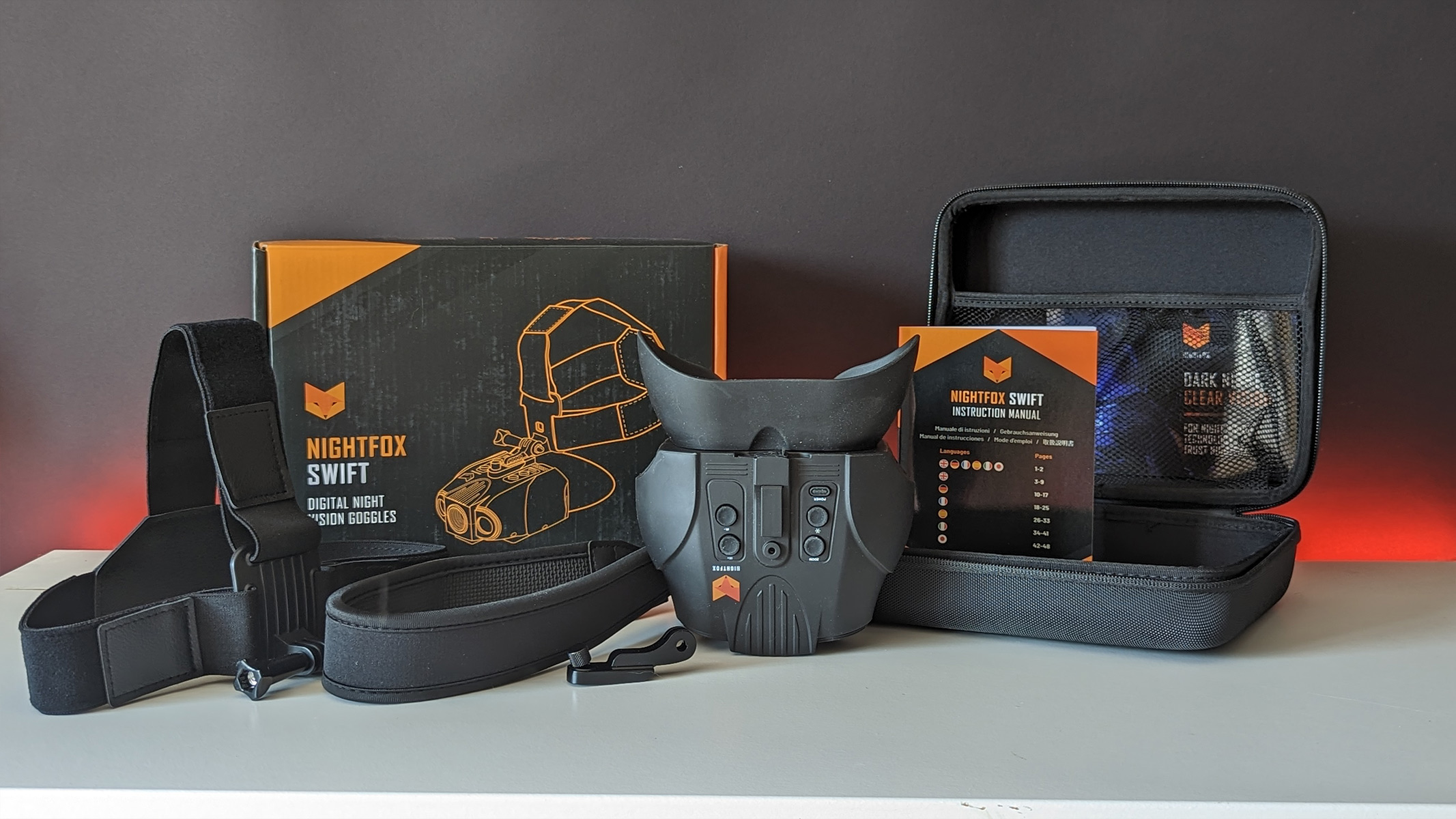
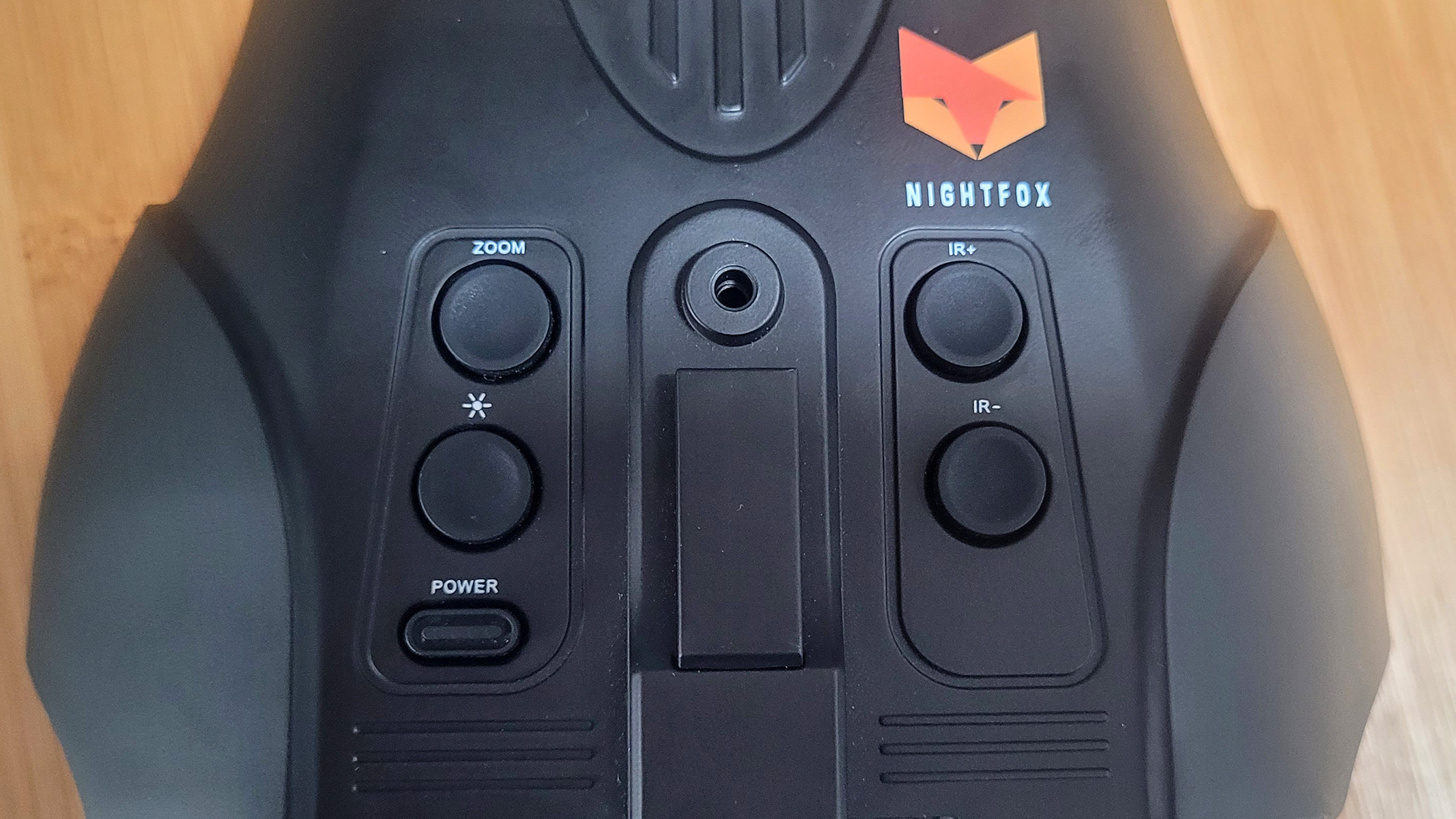
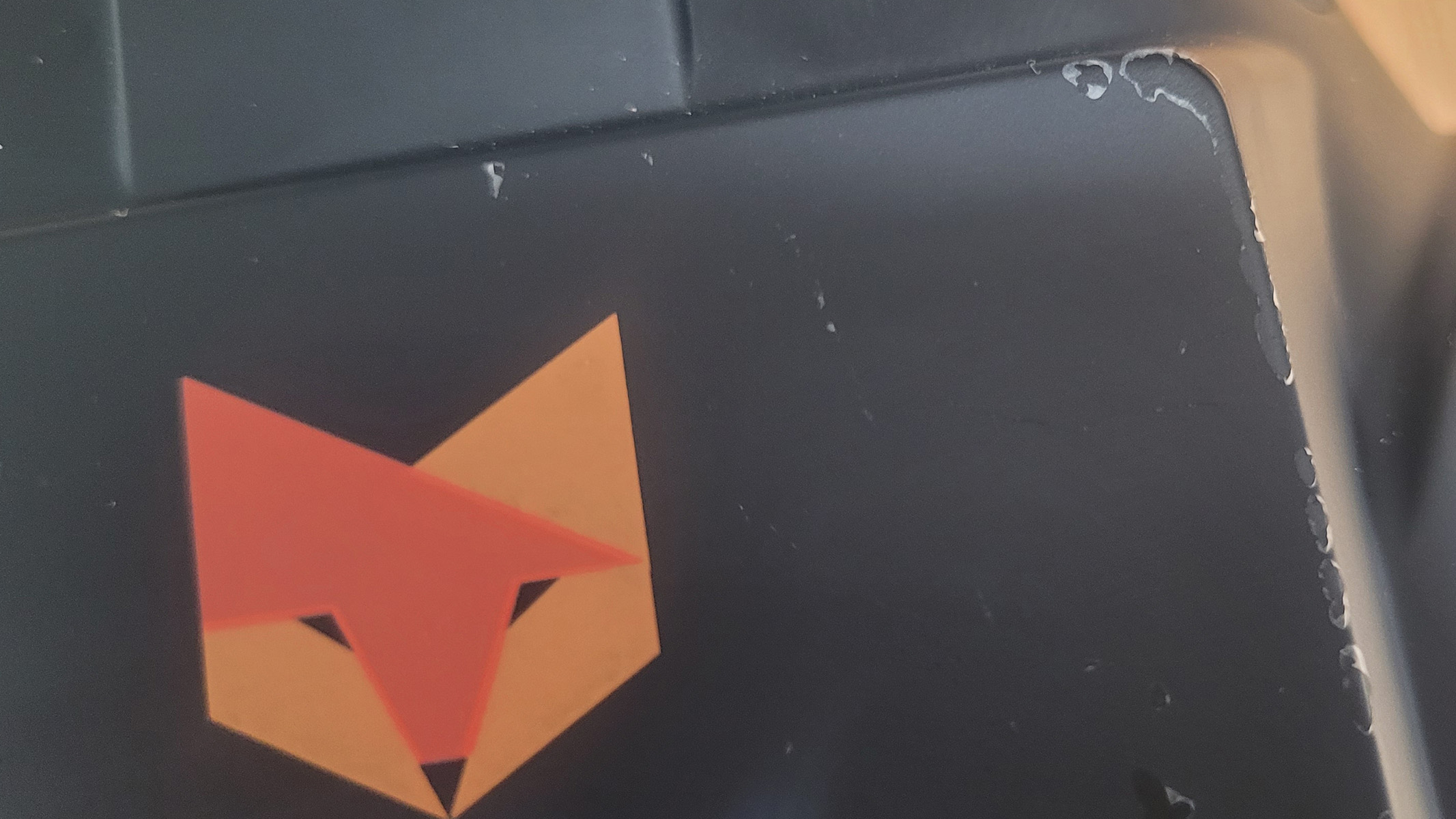
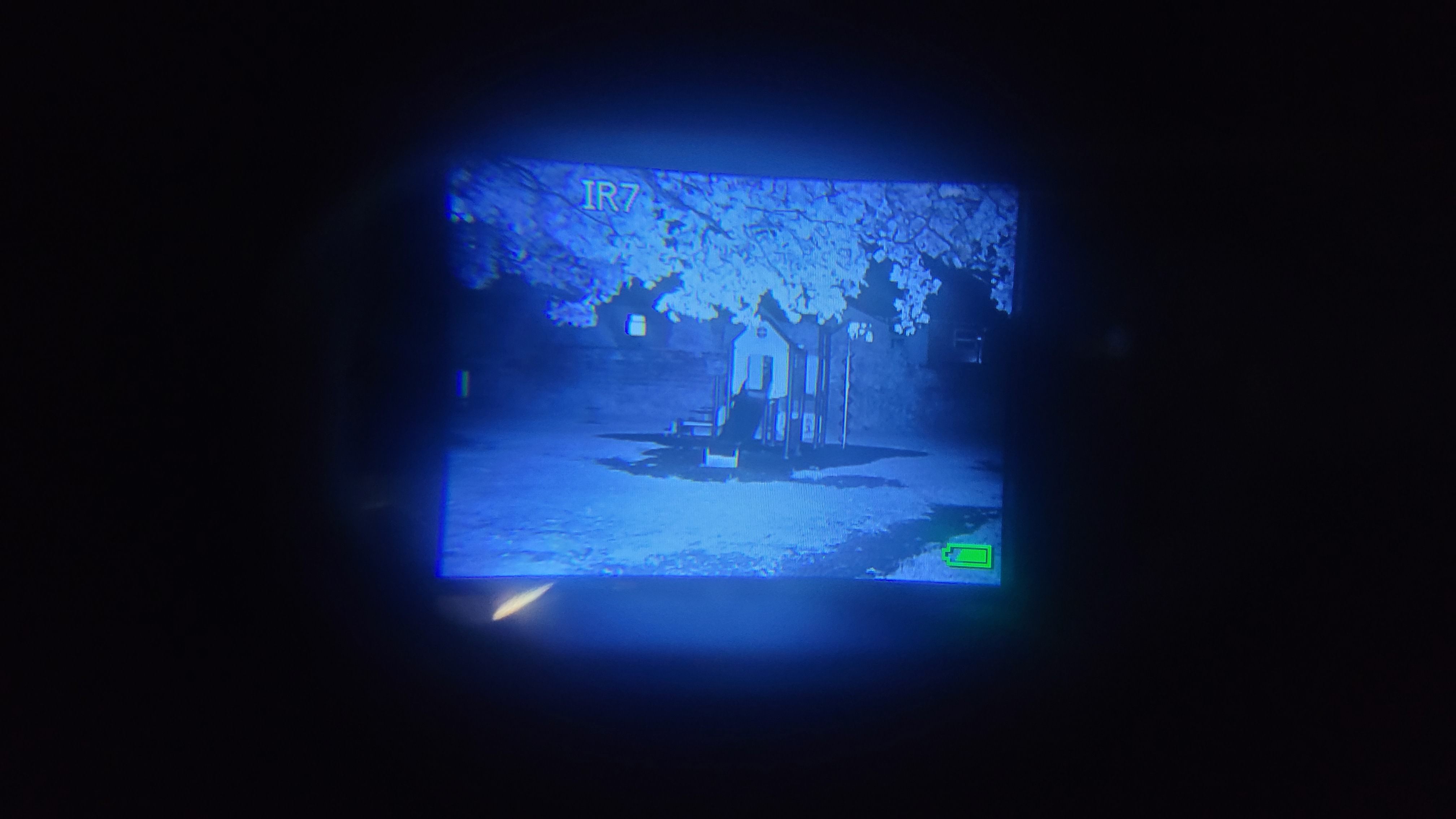
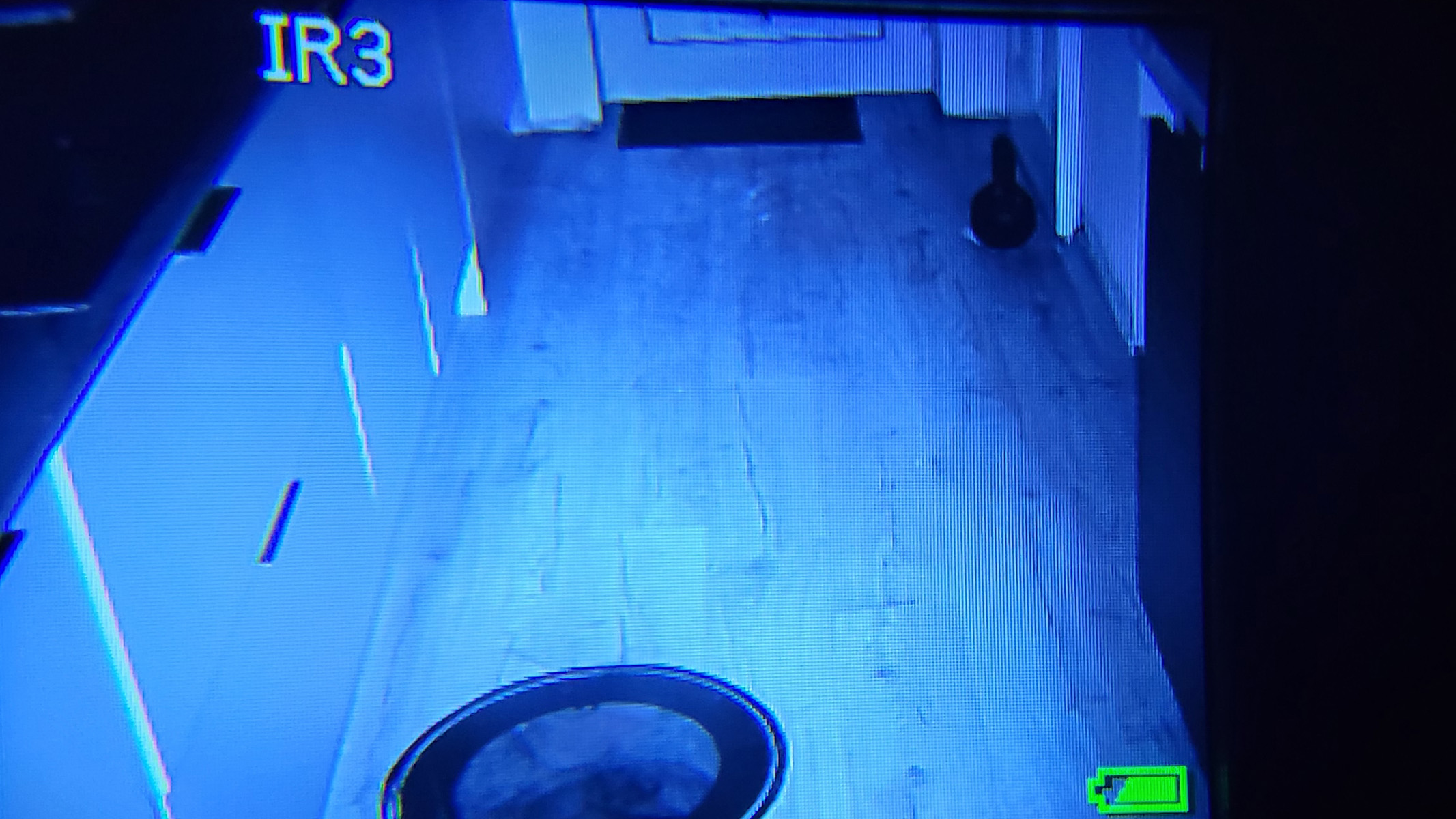
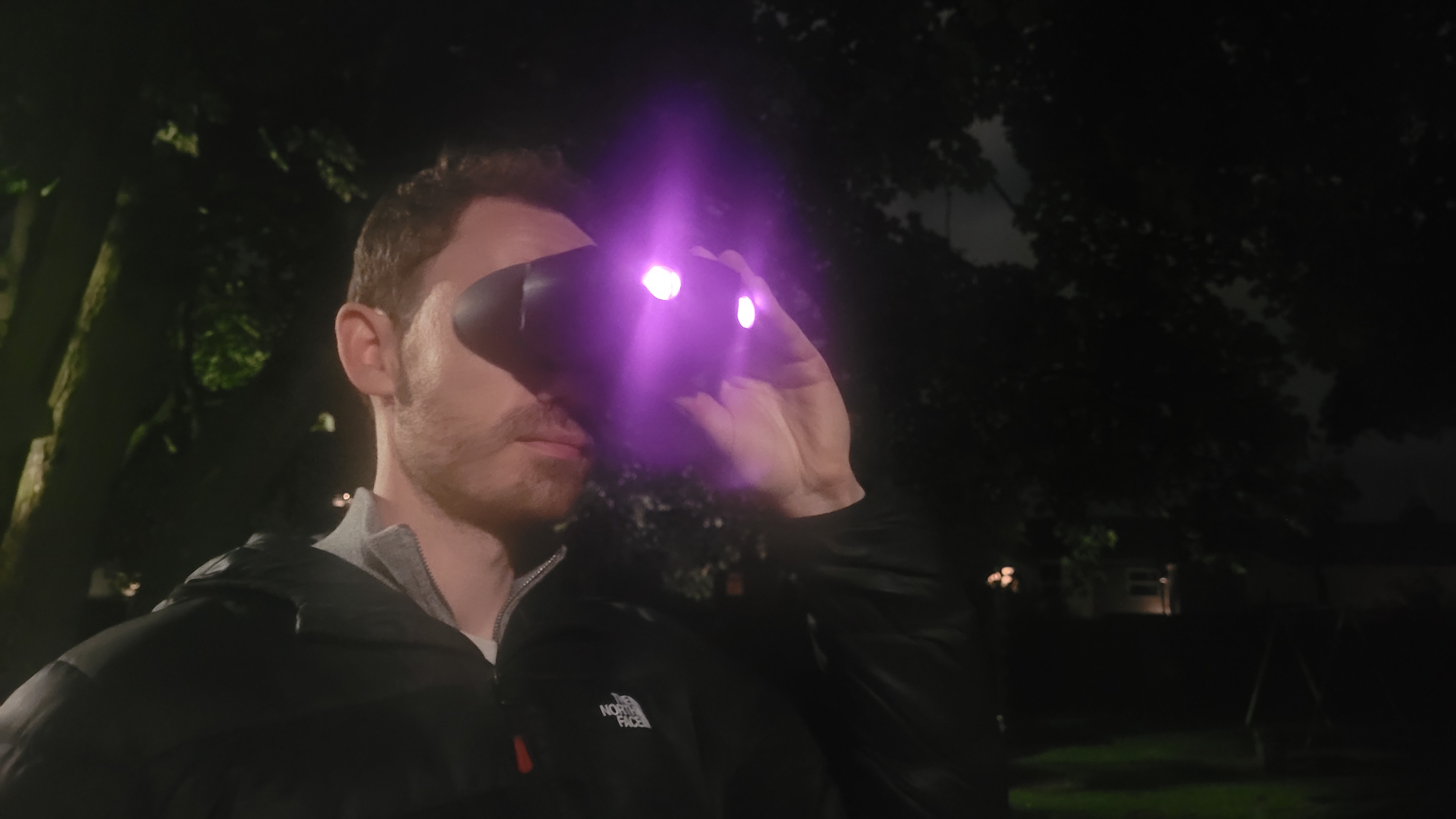
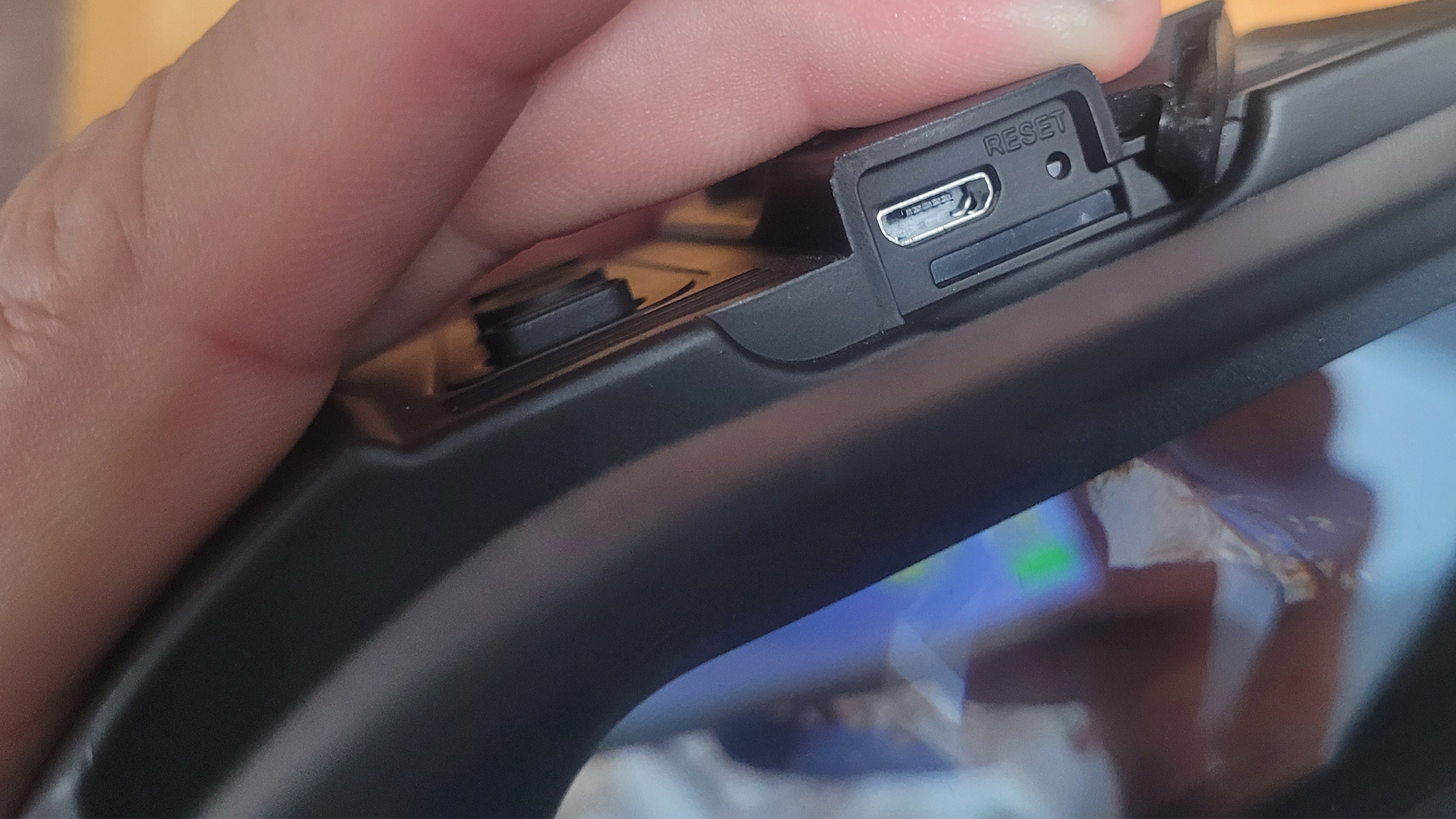
Specifications
Reasons to buy
Reasons to avoid
✅ You want something affordable: These are undoubtedly a budget pair of night vision binoculars. They offer basic night vision functionality for backyard/small park wildlife spotting, but nothing beyond that.
✅ You want something lightweight: The Nightfox Swift are very comfortable to wear on your head for extended periods of time, allowing you to explore hands-free.
❌ You're likely to use them in inclement weather: Though they would likely be fine in drizzle or fog, as there isn't an official waterproof rating you might want to avoid using them in a downpour.
❌ You want USB-C charging: Though only a small niggle, the now-dated micro-USB charging port usually means keeping an extra cable around and remembering to take it with you if you're traveling.
🔎 Nightfox Swift: A good budget pair of night vision goggles. They have limited uses but at a relatively low price point, we can't complain too much. ★★★½
While the Nightfox Swift may not be packed to the brim with features compared with some of the more high-end models in our roundup, they do a great job of letting users see in the dark and they're also available for a decent price. As we mentioned in our Nightfox Swift review, we were also amazed at how light this pair was.
Costing less than $200, it's no surprise that some features are lacking on these goggles. There's no waterproofing, for a start, so they're not exactly ideal for using in inclement weather conditions. They don't have a high magnification or the ability to take photos or record videos. But if you aren't bothered about any of those features, these are very good binoculars indeed.
Once you're used to it, you'll find they're very comfortable to use and can easily fit into one hand. They can even be mounted to your head, and their weight makes them perfectly fine to use that way for long periods, too.
The 3000mAh rechargeable battery provides approximately three hours of use. One thing we would have liked to see is USB-C charging rather than micro-USB, which by now is a bit dated. The labels on the five control buttons are also challenging to see in the dark, so we recommend familiarizing yourself with the controls before using them at night.
We liked the range of settings on offer here. You can adjust the backlight for a brighter or dimmer image and control the intensity of the infrared beam for lighter or darker results. One thing to be aware of is that higher settings might make the infrared beams visible to others.
The main drawback we noticed is that the eye guard restricts your peripheral vision, making navigating unfamiliar surroundings challenging. However, you could solve this issue by adding an inexpensive fisheye lens to increase your field of view. If recording isn't essential for you, this pair of night vision binoculars provides many features at a good price.
- Read our full Nightfox Swift night vision binoculars review
Attributes | Notes |
|---|---|
Design | Lightweight design. |
Performance | Peripheral vision dramatically hindered. |
Functionality | No waterproof rating. |
Best functionality
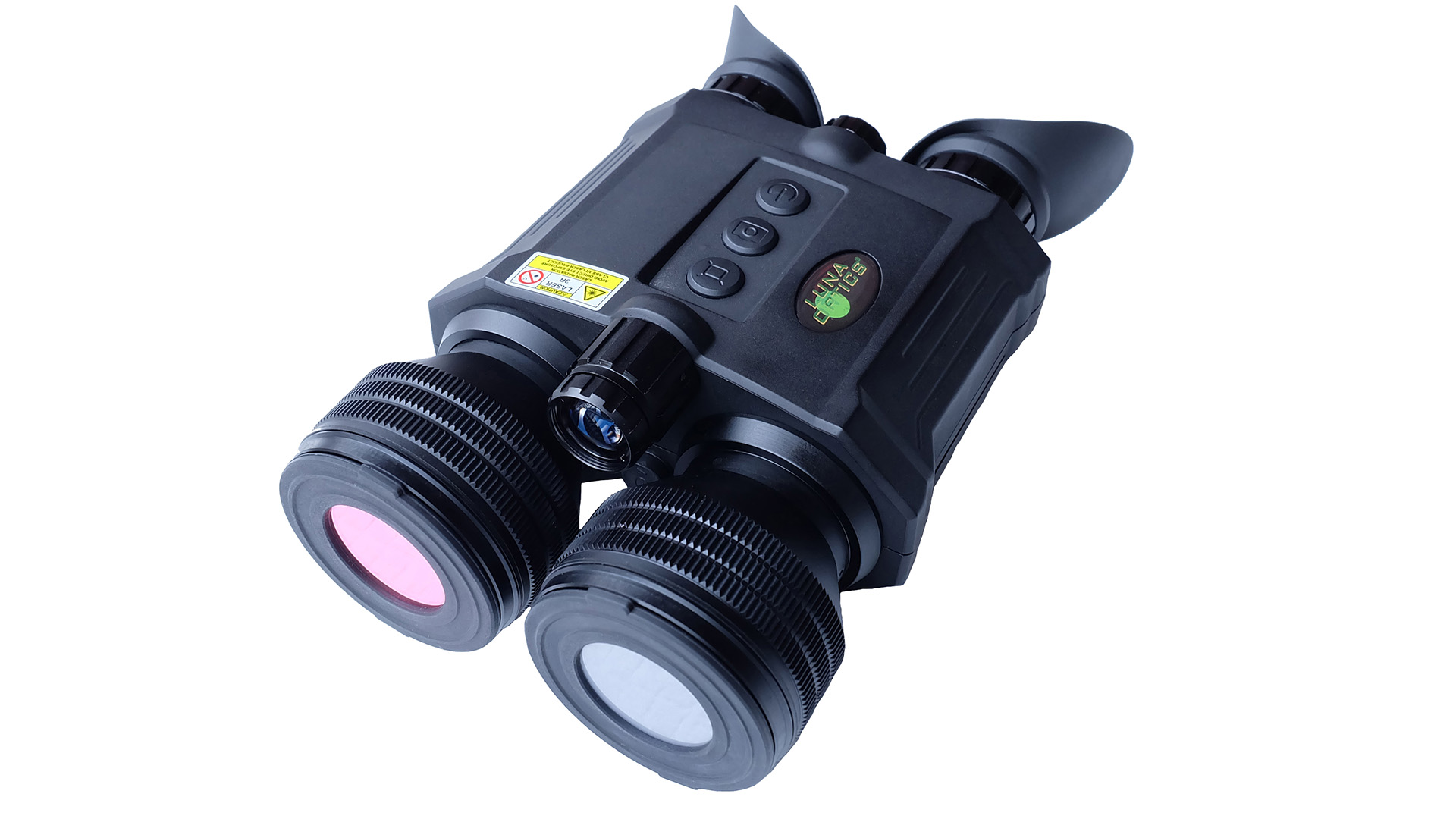
Luna Optics LN-G3-B50
Our expert review:
Specifications
Reasons to buy
Reasons to avoid
✅ You'd like a digital binocular for daytime use: Thanks to the special daytime mode, the color filter and the AMOLED screen, you can use these night vision binos as a digital binocular/camera in the daytime as well as at night.
✅ You want to record video: Not all binoculars offer this functionality, but this pair captures photos at 16.1 megapixels and video in 1080p.
❌ You need something for inclement weather: They don't have an official waterproof rating, so it's probably best to avoid these if you spend a lot of time in the rain.
❌ You're on a tight budget: This pair is pretty expensive because of the tech packed into them.
🔎 Luna Optics LN-G3-B50: A great choice if you'd like a high-quality pair of binoculars to record with, and if you'd also make use of digital binoculars in the daytime. ★★★★
One of the most impressive features of the Luna Optics LN-G3-B50 is the AMOLED-Q widescreen displays that offer fantastic views of objects or animals up to 1,970 ft (600 m) away, with a laser rangefinder that can measure distances up to 2,300 ft (700 m away). This will help you spot any wildlife you're hoping to focus on from a fair distance away.
You get a choice between black and white, night vision green and amber display options, as well as built-in color filtering to ensure a realistic color balance during daytime viewing, making this a really versatile pair of binoculars. With a digital zoom of up to 36x, you'll be able to get a close-up view of wildlife without scaring them away.
The Luna Optics night vision binoculars can also be used to take photos and record video. Images can be captured at 16.1MP, and you can record videos up to QHD at 30fps and 1080p 60fps. We should note, though, that digital zooming is restricted to up to 6x when recording video. There's space to install a micro-SD memory card in order to store your captures, or you can connect the binoculars to an external USB storage device.
Luna Optics have recently brought out a PRO version of these binoculars, which offer a new night vision white phosphor mode in addition to all the other display modes. For some people, white phosphor can appear more natural and reduce the strain on the eyes during longer viewing sessions. The LN-G3-B50-PRO model also extends the rangefinding capabilities to 4920 ft (1,500 m) and the digital zoom up to 39x.
- Looking for a bargain? Check out our Binocular deals hub
Attributes | Notes |
|---|---|
Design | Not waterproof. |
Performance | High-resolution imaging. |
Functionality | Records at the lowest magnification only. |
Best premium monocular
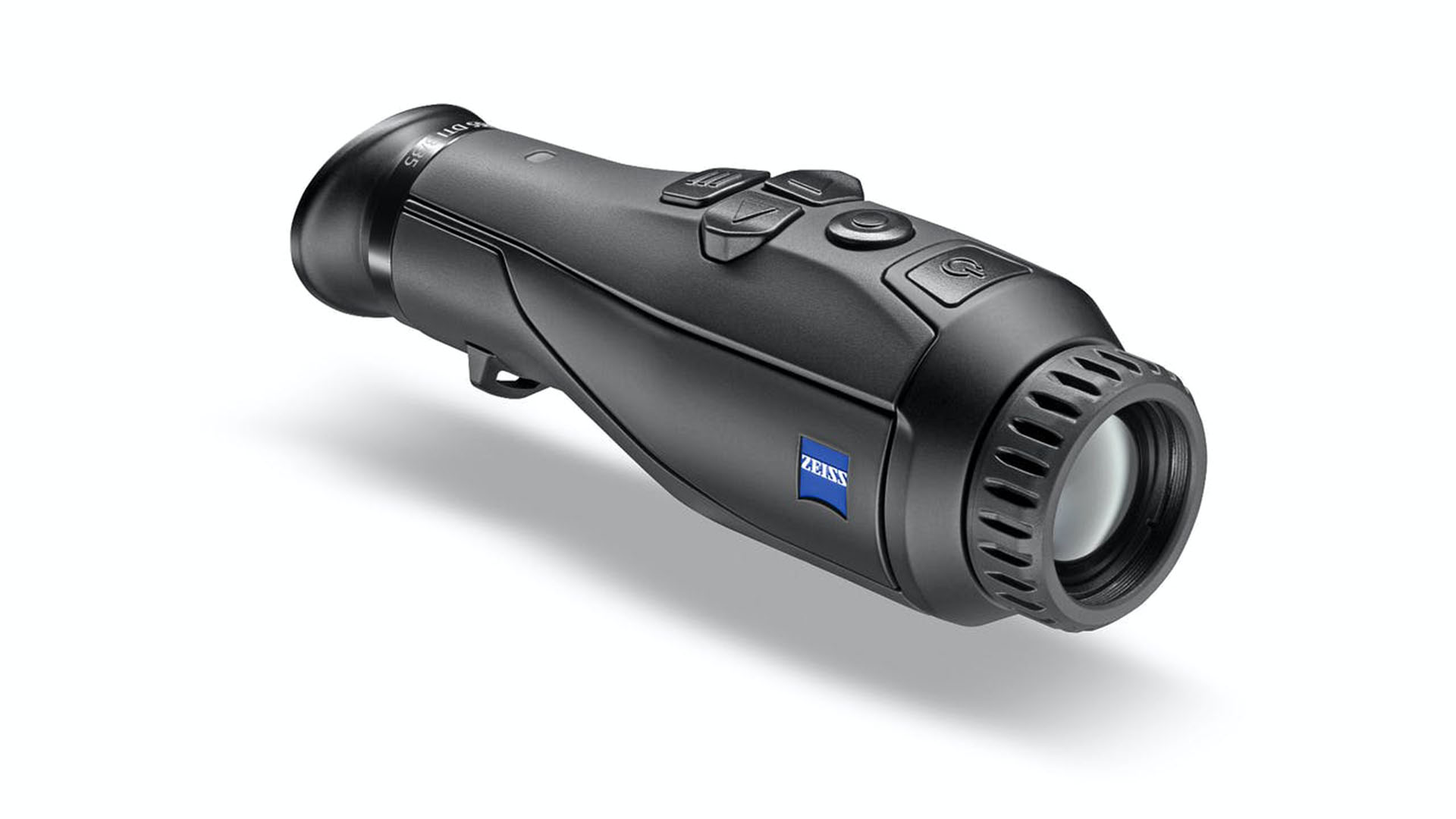
Zeiss DTI 3/35
Our expert review:
Specifications
Reasons to buy
Reasons to avoid
✅ You want to see far into the distance: The Zeiss DTI 3/35 has one of the longest viewing ranges on this list and a huge 3937 ft / 1200m IR range.
❌ You're on a budget: At over $2500, the Zeiss DTI 3/35 is one of the most expensive models in this guide.
🔎 Zeiss DTI 3/35: With the longest viewing range but also one of the highest price tags, this is for someone who will use it on a daily or very regular basis. ★★★★
With Zeiss, you are guaranteed the highest optical quality and the DTI 3/35 monocular lives up to those expectations. Rather than a fully-fledged night vision model, this is a thermal imaging monocular but operates in more or less the same way in most uses, and is especially fantastic at observing wildlife at night.
The speedy 50Hz refresh rate means it has no problem keeping track of fast-moving objects. The option to overlay a zoomed-in image on top of the main one lets you enjoy a close-up view with less risk of losing your subject if it decides to make a sudden move. The Zeiss DTI 3/35 offers 2.5x optical zoom and up to 4x digital zoom increasing in 0.5x increments, and an impressive range of 1,350 yards (1,234 m).
When it comes to night vision, you get four color options — a standard white view, an inverted dark image, red to highlight heat sources and a rainbow mode that shows variations in temperature. You can also use red brackets to track the greatest heat source within the frame, which is handy for spotting animals among foliage. The monocular allows you to record up to 15GB of video and share them to your phone via the Zeiss app.
Zeiss recently released an updated version of the DTI 3/35. This second generation comes with an improved AMOLED display with better image quality and new color modes which focus on reducing glare and combating potential eye strain. It comes with a slightly higher price point, but if these features are important to you, it's worth considering when shopping for the best night vision binoculars.
- Related: Best compact binoculars
Attributes | Notes |
|---|---|
Design | No memory card slot. |
Performance | High quality optics. |
Functionality | Detection up to 1200m. |
Best budget
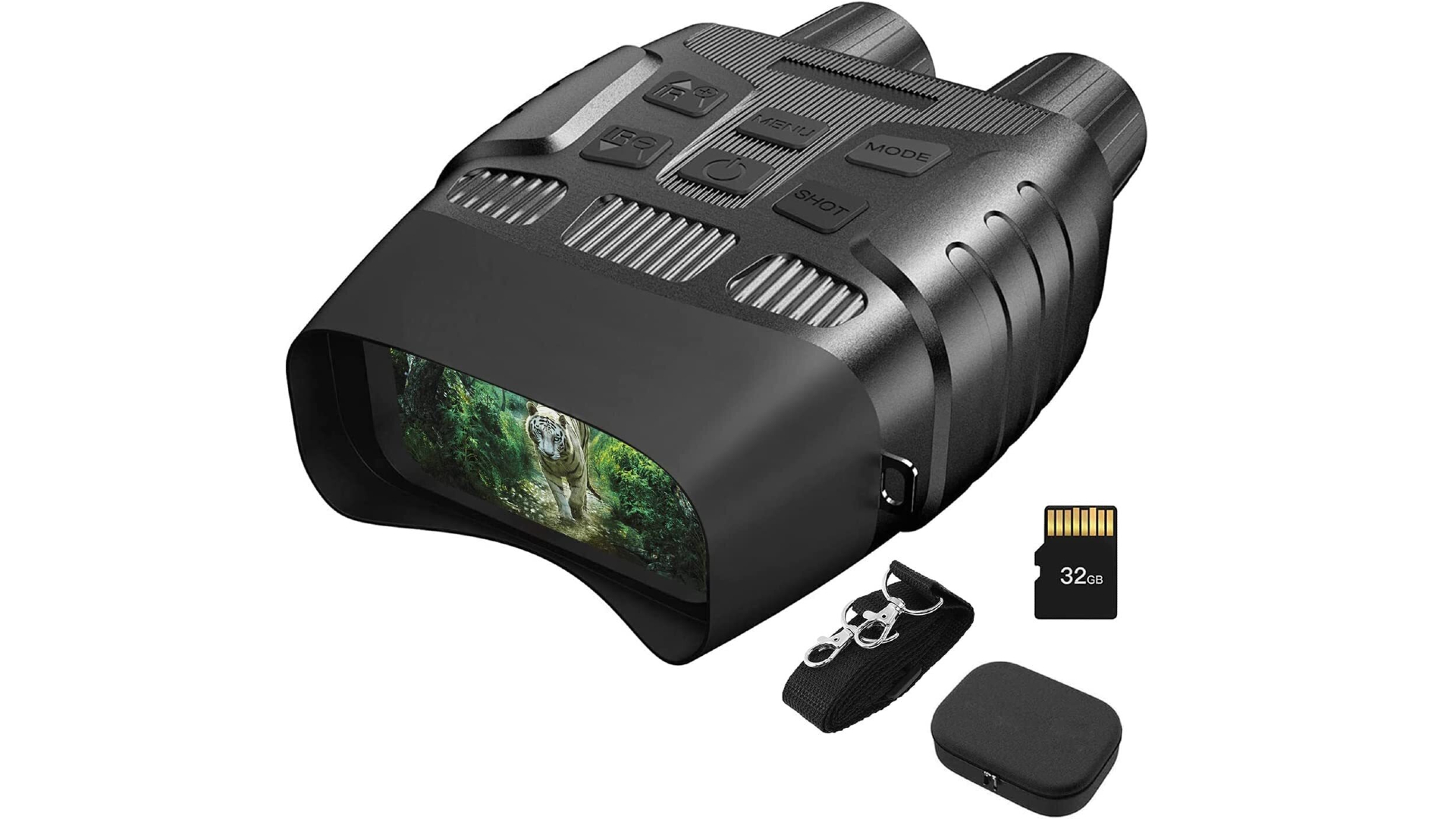
Hexeum Night Vision Binoculars
Our expert review:
Specifications
Reasons to buy
Reasons to avoid
✅ You want something waterproof: The Hexeum Night Vision Goggles are IP66 rated, which means they are protected against high-pressure (12.5mm) water jets.
❌ They aren't on offer: The price of this model fluctuates dramatically throughout the year, with the biggest discounts seen around Amazon Prime Day and Black Friday. Don't pay more than $130 for them.
🔎 Hexeum Night Vision Binoculars: If you can get them at a good price they are worth the purchase, but bear in mind they require six AA batteries, which will make them heavier and add an ongoing expense. ★★★★
The Hexeum Vision Binoculars represent great value if you are relatively strapped for cash, and offer views that you would normally only expect if you shell out for a more premium pair. They also include plenty of the features you may expect with the higher-end night vision binoculars, meaning they represent excellent value for money.
The image quality on these binoculars is very impressive, largely thanks to their fully multi-coated lenses which offer excellent light intake. They feature a 4x digital zoom, a CMOS sensor and, surprisingly for this price range, they're also capable of recording HD video and capturing images. If you want to attempt to capture wildlife at night, these are an excellent option — you'll even get a 32GB memory card included in the box so you can hit the ground running straight away.
Taking these binoculars out and about, we enjoyed the 10-degree viewing angle combined with the 24mm aperture; this meant you could scan large areas without much movement, which is great for spotting any significant points of interest. They also have an incredible continuous runtime of eight hours with the adjustable IR switched on, or 17 hours without.
The only major downside to the Hexeum Night Vision Binoculars is that they require 6x AA batteries and are incompatible with rechargeable batteries, so you'll need to be willing to keep forking out for more batteries over time with this pair.
- Don't ruin your night vision — take a look at the Best headlamps for stargazing
Attributes | Notes |
|---|---|
Design | IP66 waterproof rating. |
Performance | Remarkable continuous runtime. |
Functionality | Requires 6 x AA batteries - not compatible with rechargables. |
Best for slow-motion video
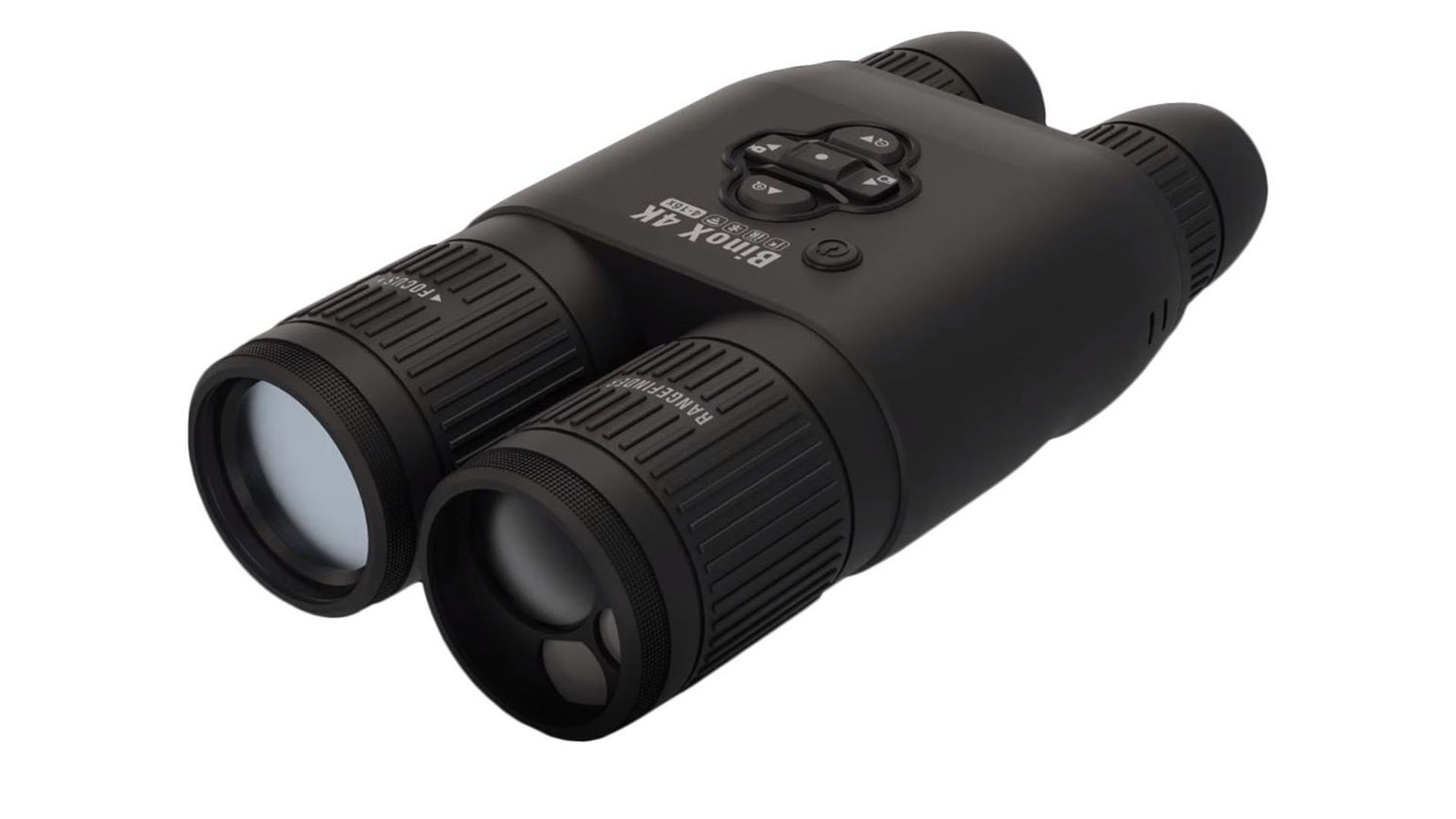
ATN Binox 4K
Our expert review:
Specifications
Reasons to buy
Reasons to avoid
✅ You want to record Ultra HD video, day or night: You can capture excellent 4K video with no loss of resolution up to 10x magnification.
✅ You'd like a built-in laser rangefinder: Share real-time rangefinder information with other mobile phones to notify others of the location of your subject.
❌ You won't utilize all the functionality: If you don't need all of the technical functionality, pick a cheaper pair like the Nightfox Swift.
🔎 ATN Binox 4K: A highly functional pair of binoculars complete with120fps recording and real-time, shareable rangefinder information. ★★★½
The price here may put off many users on shoestring, but the ATN Binox 4K night vision binoculars are certainly worth the money if you have the budget to spend. This piece of kit offers wide-ranging functionality and especially excel at capturing fast-motion video in low-lighting conditions or harsh weather.
These binoculars can share real-time rangefinder data with others through mobile devices, and send laser tags. This feature is particularly useful for coordinating the positioning of a group out observing or photographing wildlife outdoors. Thanks to an IR illuminator, the ATN Binox 4K boasts a range up to 3,280 ft (1,000 m).
These night vision binoculars are capable of capturing video too, although this is limited to 1080p. We particularly like their live stream feature: using the ATN Obsidian 4 app on Android or Apple, you can live stream and record at the same time (though streaming is capped at 720 p). Within the dedicated app, you can save and share content, as well as create slow-motion effects as you can record up to 120 fps.
One thing we like about the ATN Binox 4K is its extremely low power consumption. Its internal battery can last up to 15 hours, and it's chargeable using a USB-C charging port. A micro SD card is needed for storage, and you will need to supply your own as it doesn't come with one included.
- Check out our best tripods buying guide
Attributes | Notes |
|---|---|
Design | Quite heavy. |
Performance | Long battery life. |
Functionality | Extremely low power consumption. |
Best for simplicity
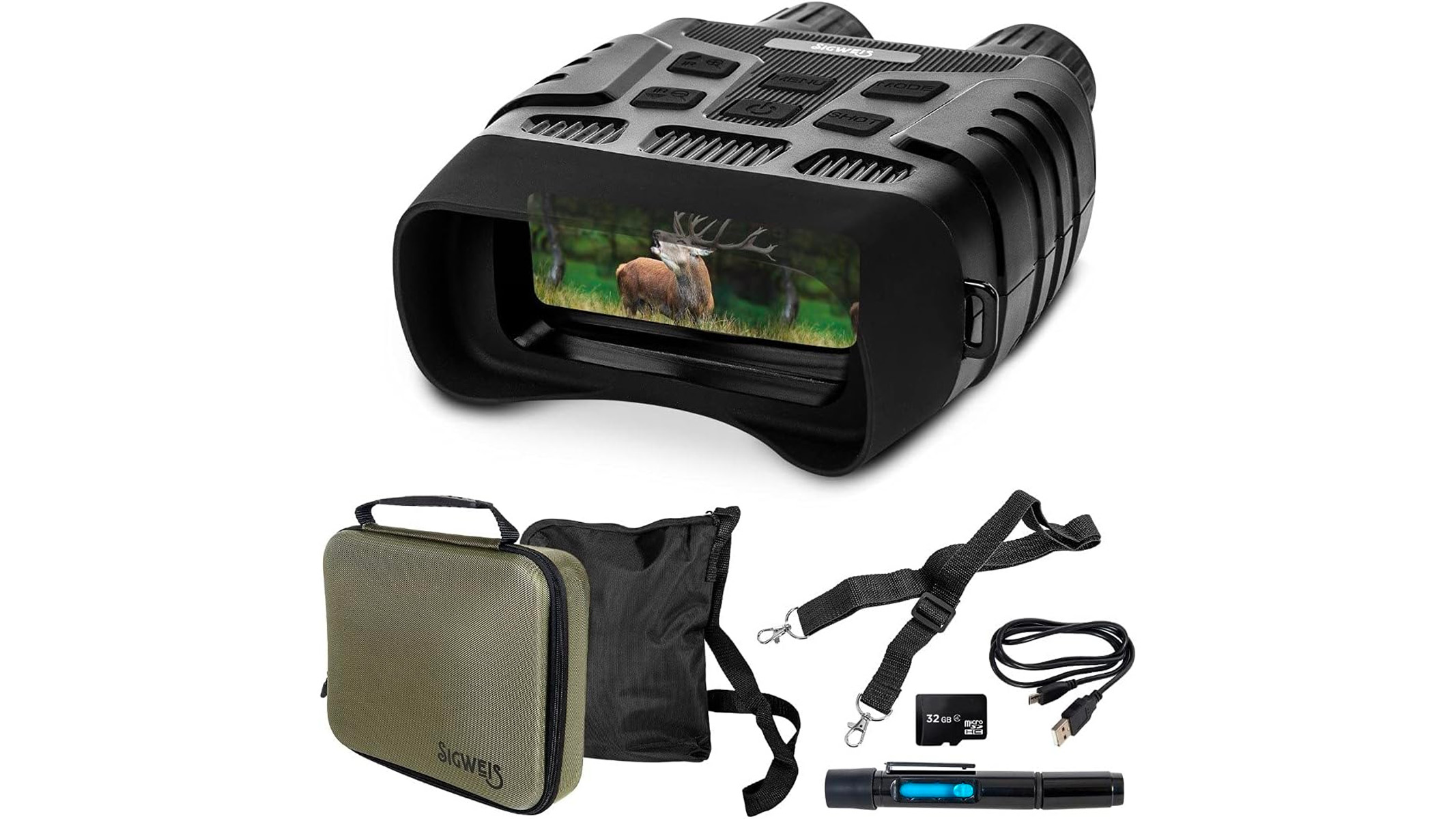
Sigweis Night Vision Binoculars
Our expert review:
Specifications
Reasons to buy
Reasons to avoid
✅ You want to record footage: These binos allow you to record footage onto a micro SD card.
✅ You want long battery life: These last 8 hours with the IR on full power, and 16 hours of regular daytime use.
❌ You want something lightweight: At 2.86 lbs / 1.3kg, these binos are heavy to use and carry for extended periods.
🔎 Sigweis Night Vision Binoculars: These neat night vision binos are on the bulky side, but they're easy to use day and night and have a simple setup ideal for beginners. ★★★★
For newcomers, we would highly recommend the Sigweis Night Vision binoculars given how easy they are to use and straightforward to get hands-on with thanks to a simple six-button layout. They have a fantastic number of features to offer, too, including recording full HD video and snapping images at 3MP.
These night vision binoculars have a solid build quality but, as a result are a little bulky. You'll certainly find sleeker looking models on the market, but for the price point, they certainly feel good enough quality in the hands. The Sigweis night vision binoculars are a little on the heavy side, however: they weigh 2.86lbs/1.3kg, so you'll quickly notice if you're lugging them around and holding them up to your face for long periods of time. Thankfully, they can be mounted to a tripod to take the weight off, but that of course reduces their portability. On the plus side, they are IP56 waterproof rated, so they can be used in just about any weather condition.
Video can be captured in both night vision and daytime color modes, and you can capture up to 2.5 hours worth of content. There's built-in storage to allow for up to 9,999 images and, unlike some other models, you can view your captures right in the viewfinder without needing to export them to a PC first.
It comes equipped with all the accessories you'd need to go along with it, including a custom-fit military-grade hard case, carbon-tipped lens cleaning brush, a 32GB high-speed Micro SD Card (Inserted in Camera) and adapter, shoulder strap and soft carry bag, a soft lens cleaner cloth, USB cable and a user manual. The only thing it doesn't include is batteries — you'll need 6 x AA batteries, and sadly it's not compatible with rechargeable ones.
- Read our best power banks guide
Attributes | Notes |
|---|---|
Design | Heavy but tripod mountable. |
Performance | Long battery life. |
Functionality | Ability to take photos and videos day and night. |
Best night vision monocular
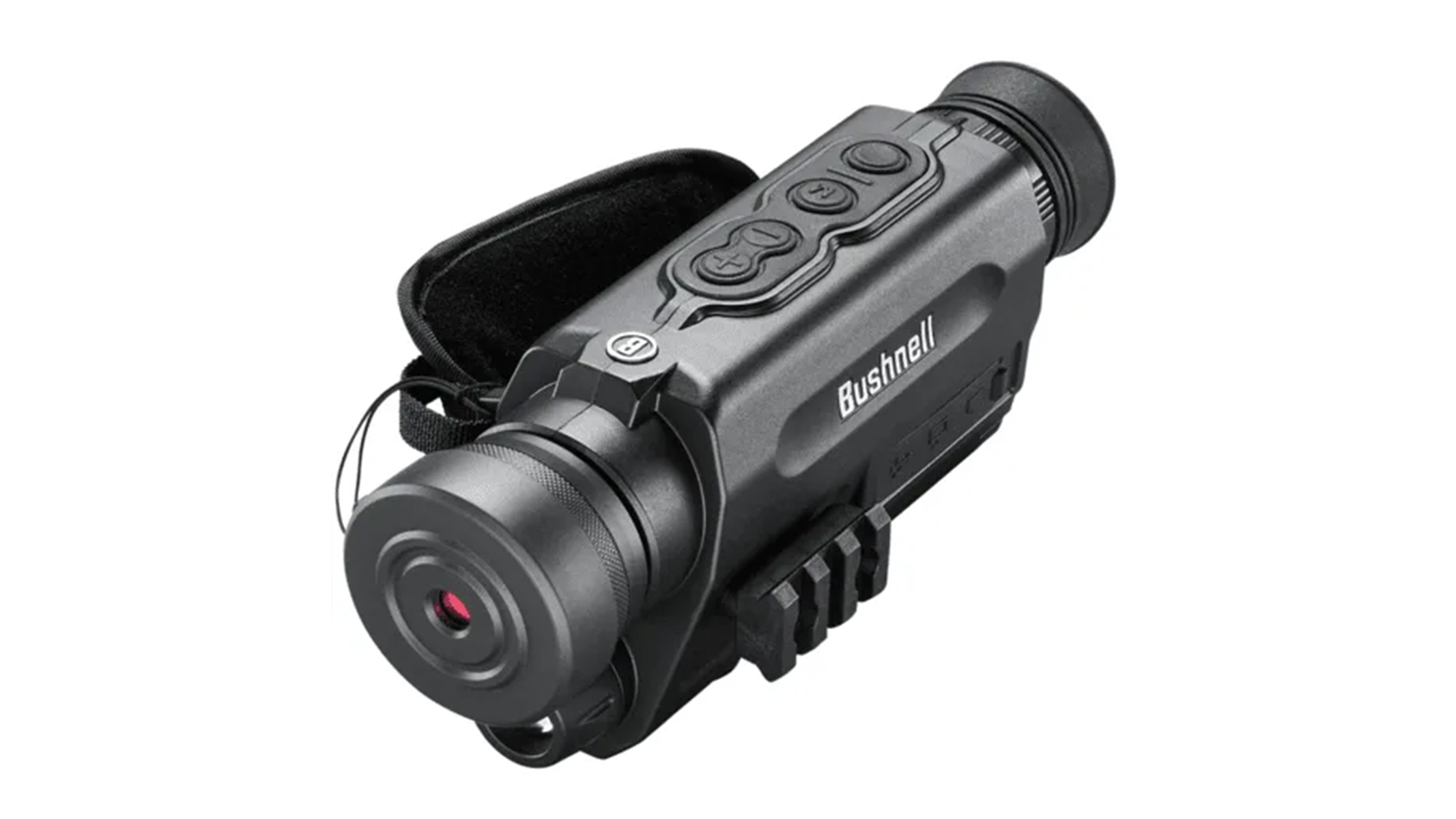
Specifications
Reasons to buy
Reasons to avoid
✅ You want to film what you see: This monocular can record video and comes with a micro SD card included.
❌ You want a durable, rugged monocular: Its plastic build makes it feel more fragile or flimsy than others.
🔎 The Bushnell Equinox X650 monocular has a powerful built-in infrared illuminator enabling you to see in the dark up to 650ft away. It doesn't have the most solid build or the best zoom, but if you want to create video content, it's a great option to consider.
This Bushnell Equinox X650 monocular is meant to grant you a night vision range of up to 650 ft (200 m) thanks to its built-in infrared light, which is impressive. It also has video capabilities which give you the ability to record what you observe, and it comes with a Micro SD card so you can get shooting immediately. It's a strong feature for content creators and people wishing to immortalize what they see, though the image quality is a little lacking.
We're also a little disappointed by the Bushnell Equinox X650's build quality. It's built from plastic and requires batteries to operate, making it quite flimsy compared to other, more rugged models on the market. Its zoom is also not as strong as some of its competitors.
That said, for the price, there's plenty to like here, and the Bushnell Equinox X650 delivers great optical clarity and good functionality.
- Read our full Bushnell Equinox X650 review
Attributes | Notes |
|---|---|
Design | Plastic build feels cheap. |
Performance | Not the strongest zoom. |
Functionality | Video recording, built-in IR illuminator. |
- Check out the best binoculars in 2024
Best for long range
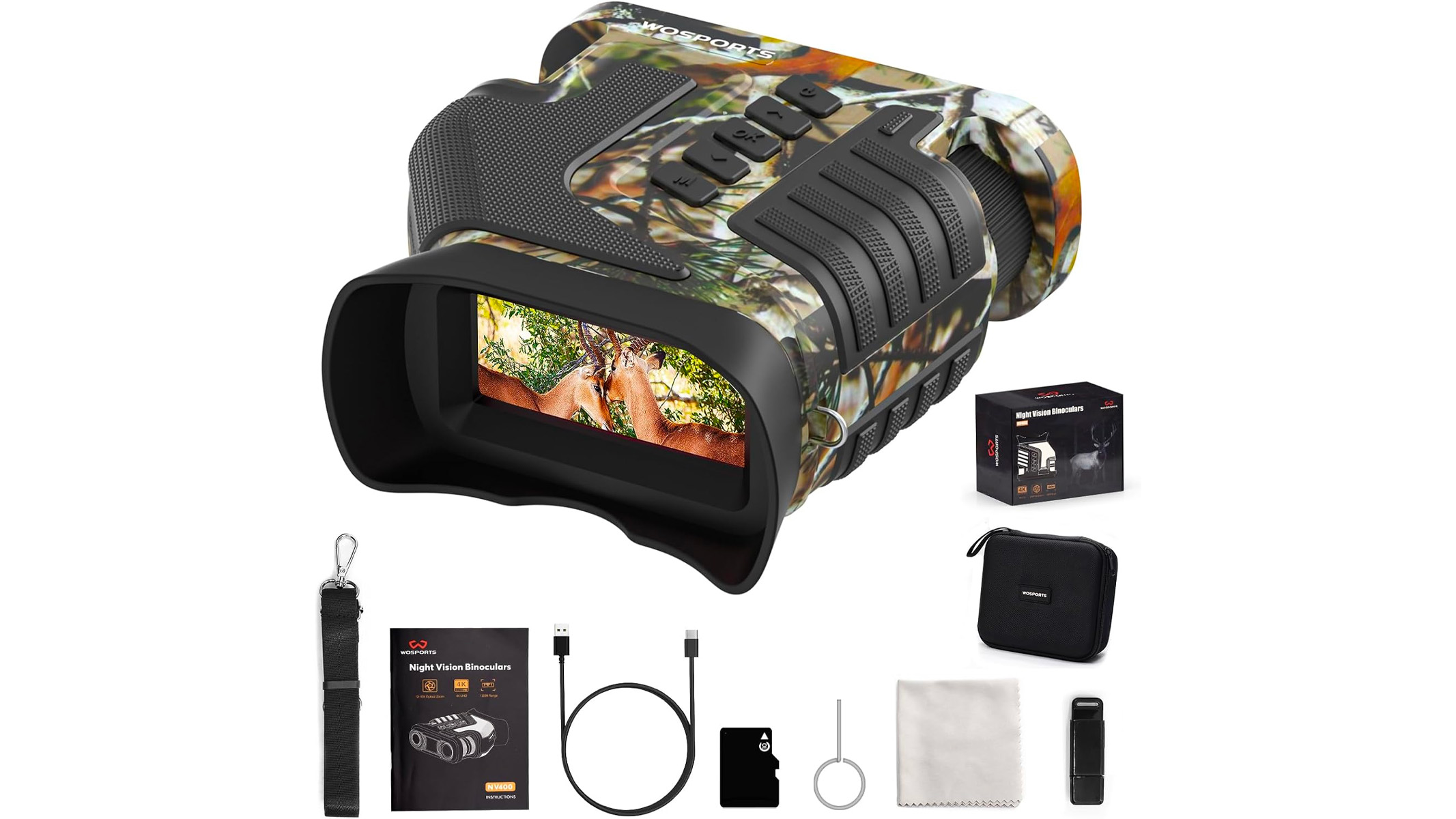
WOSPORTS 4K Night Vision Binoculars
Our expert review:
Specifications
Reasons to buy
Reasons to avoid
✅ You want detailed images: These binoculars can capture 16MP images and 4K video footage.
✅ You want long battery life: 10-15 hours of battery life will see you through those long observation sessions.
❌ You don't want to gamble: There are mixed customer reviews on these binoculars, making it hard to tell whether they'll live up to their claims.
🔎 WOSPORTS 4K Night Vision Binoculars: On paper, they're a dream. Long 1300ft+ viewing range, generous battery life and detailed footage — but the mixed reviews may put buyers off. ★★★★
There are plenty of excellent use cases for the WOSPORTS 4K night vision binoculars, which is our pick for the best pair for range. Whether you're bird watching, camping or even hunting, you can take advantage of the powerful magnification and a host of great features to capture all kinds of stunning views outdoors.
They offer impressive battery life, equipped with a 3.7-volt 5000mAh rechargeable battery — meaning you don't have to keep stocking up on batteries. On a single charge, you can capture black and white photos and videos in total darkness for more than 10 hours, and over 15 hours of stunning color images and videos during the day.
They excel at capturing stunning 4K UHD video (with sound) and images with a respectable 16MP resolution, and there's a different mode for capturing, recording and playback. The 3-inch screen means you can view your photos and video footage with clarity and detail. They have three different night modes to choose from (red, white or green) and they feel solid and well-made.
The range offered by the WOSPORTS night vision binoculars is impressive too: you can view targets up to 1,315 feet (400 m) away. It's not the biggest range compared to some other night vision binoculars on this list, but it's still rather impressive. Add to that an up to 10x optical zoom and an 8x digital zoom, and you can get up close and personal to the objects or creatures you'd like to observe.
The WOSPORTS 4K night vision binoculars are also waterproof, making them great for use in all weather conditions. They come with a storage box, neck strap, a 32GB SD card and a cleaning cloth inside the box, too.
- Read our best telescopes buying guide
Attributes | Notes |
|---|---|
Design | Solid and well made. |
Performance | Good 10-15 hours battery life. |
Functionality | Captures 16MP images and 4K video footage. |
Best affordable monocular
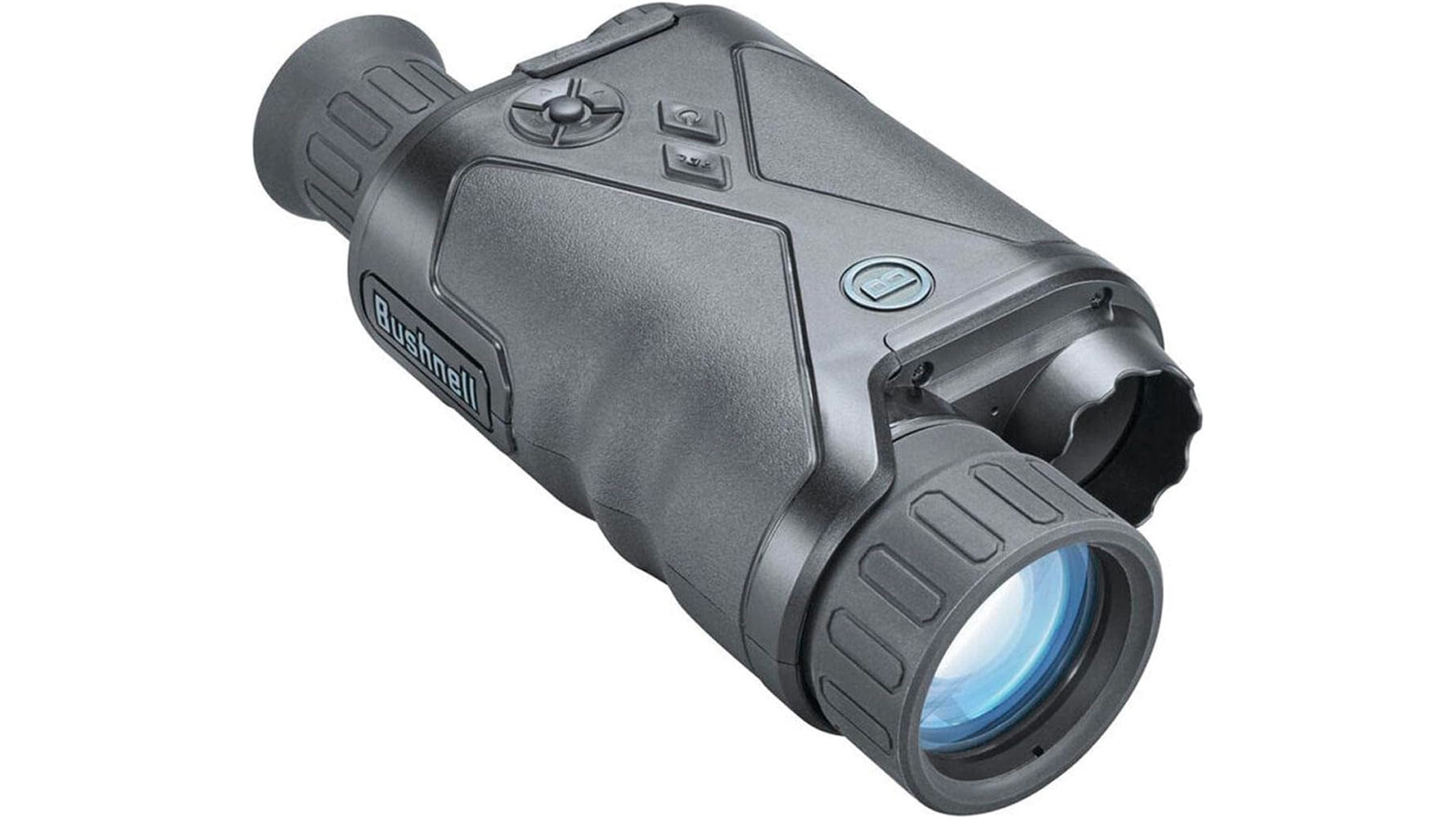
Bushnell Equinox Z2
Our expert review:
Specifications
Reasons to buy
Reasons to avoid
✅ You don't have a massive budget: While it's certainly not cheap, there are much more expensive models on the market.
✅ You want options: There are three different variants to choose from — 3 x 30, 4.5 x 40 and 6 x 50.
❌ You want a decent battery life: The battery life is short and it runs on 4 x AA batteries.
🔎 Bushnell Equinox Z2: For users without a huge budget, this monocular is a decent option. You won't get the same specs as the more premium options, but it does the job nicely. ★★★½
While you will certainly be compromising with the Bushnell Equinox Z2, there is still plenty going for it which means it's a solid pick if you're limited by a budget. This monocular is made by a highly reputable brand, and there are plenty of features included in the device that make it a solid option. Firstly, you can capture great footage or still images with a resolution up to 1080p, and you can easily hook it up to your smartphone or laptop to upload the media files.
Bushnell says you'll experience edge-to-edge resolution when using this monocular, along with, increased light transmission and reduced glare, offering a crisp, clear and illuminated image every time.
It can be used during the day or in moderately lit areas at night with the objective lens cover on (it has a pinhole to restrict light entry). The controls are easy to understand, but we'd recommend reading the online manual to fully grasp all the features.
There are three different models available — 3 x 30mm, 4.5 x 40mm and 6 x 50mm. They also come with a generous lifetime warranty and a carry case for safe storage and to protect it during transport, although we'd have liked there to be a memory card included, especially for the price. Still, we think it's a decent balance between affordability and premium features.
- Check out the best monocular models on the market
Attributes | Notes |
|---|---|
Design | Durable, waterproof and shockproof. |
Performance | Very short battery life. |
Functionality | Comes in three different variants. |
Skywatching highlights this month
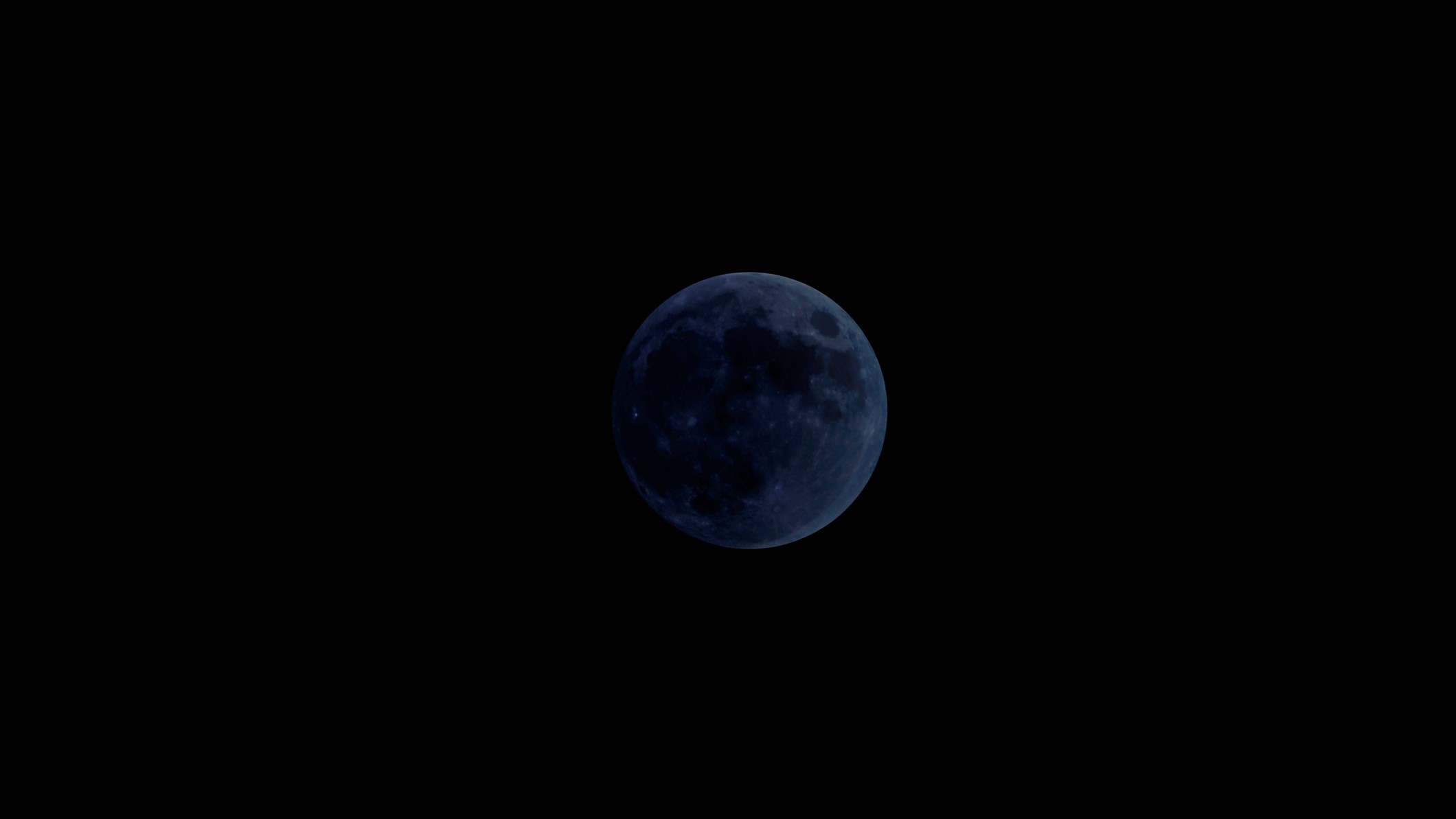
Jan. 18 - New moon darkness for gazing at star fields
Jan. 18 is the new moon and is when the skies will be the darkest and free of light pollution from the moon. With a dark sky, it becomes easier to see faint deep sky objects like clusters, galaxies and nebulas.
Try scanning the Milky Way through Cassiopeia and Cygnus with night vision binoculars to observe star fields that regular optics struggle to pick up.
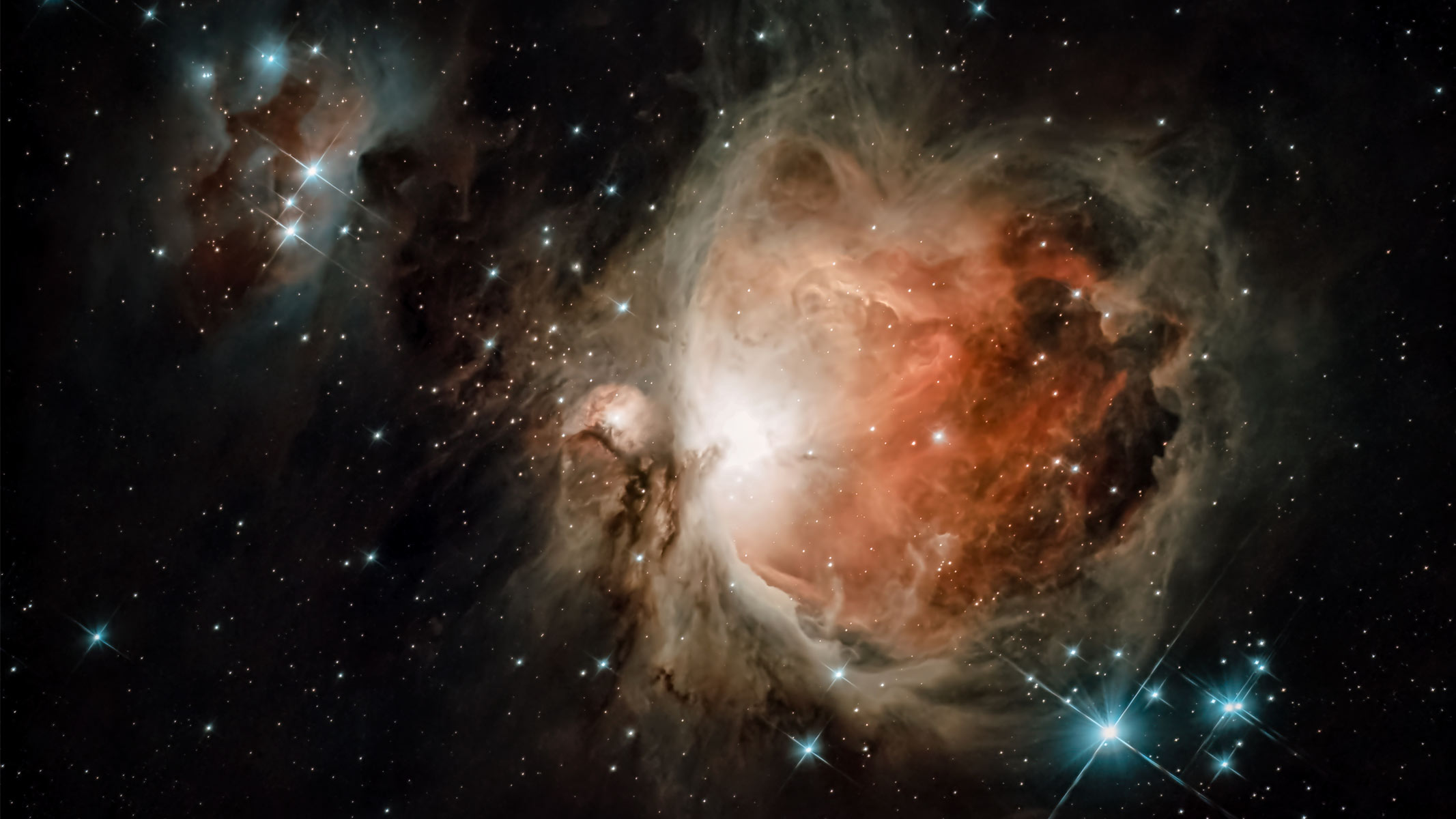
Jan. 18 - Get a brighter view of the Orion Nebula
The Orion Nebula (M42) is one of the most stunning nebulas in the winter night sky. Whilst semi-visible with the naked eye, using magnification gets you a better view. Using night vision will get you an even brighter view and reveal more details of the structure of the nebula.
It can be found in Orion's sword, just hanging down from Orion's belt.
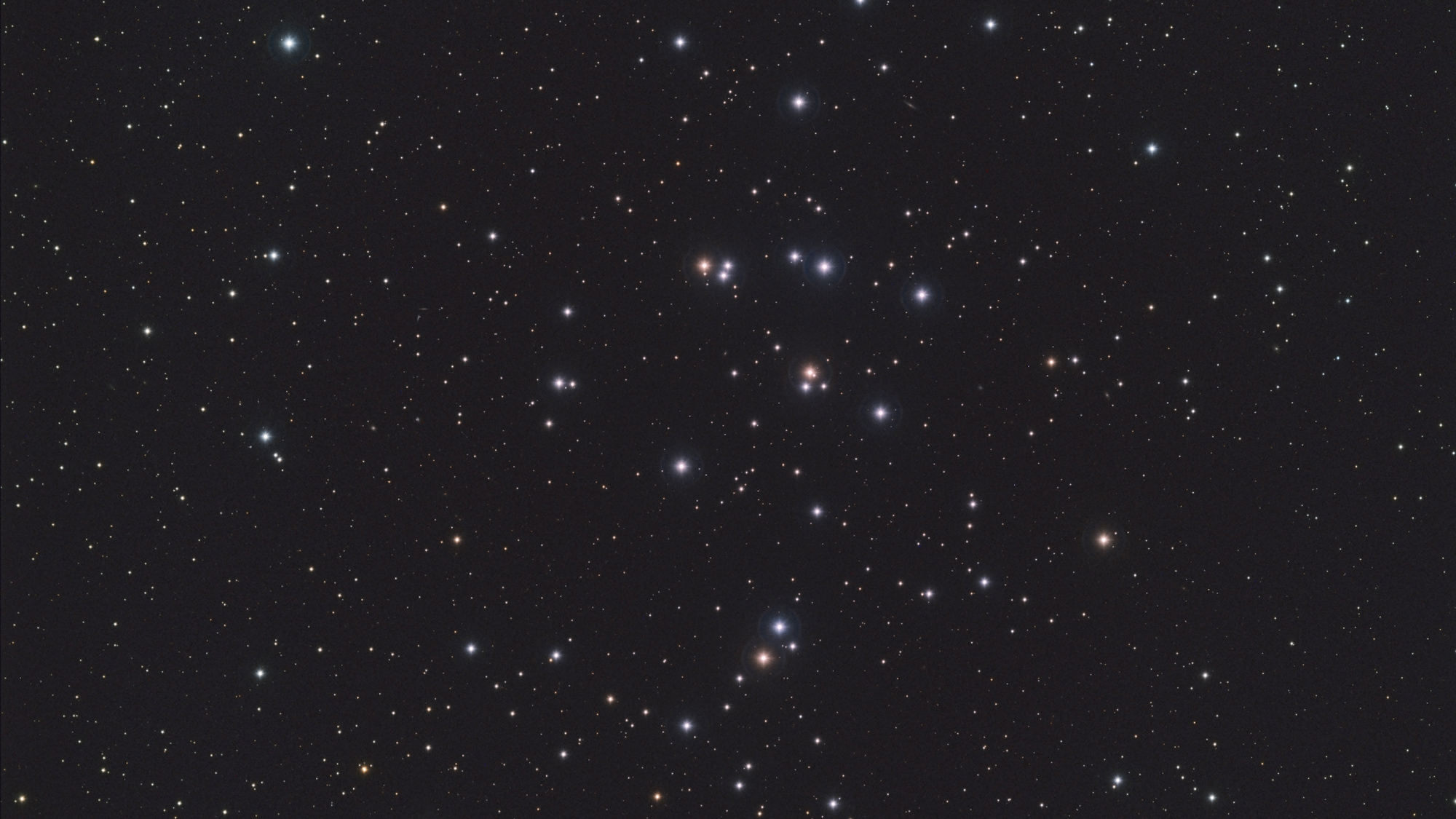
Jan. 18 - Catch the buzzing of the Beehive cluster
The Beehive cluster (M44) is an open star cluster lying near the center of the constellation Cancer. It contains around 1000 stars and is a good night sky target for binoculars.
Using night vision binoculars will help you get a better look at all of the stars in this impressive cluster and make it even more dazzling.

Russ Swan is a UK-based freelance science writer and author with a love of all things related to space and aviation. He built his own 100mm refractor telescope from some bits found in a military surplus store, and once had lunch with Neil Armstrong. His popular science book The Physics Behind… explains not just how the universe works, but why.
Best night vision binoculars: Frequently Asked Questions
Are night vision binoculars reliable?
Most night vision binoculars will offer great views of the night sky and wildlife, good functionality and quality optics, and they should bring January's cosmic events closer.
However, not all those available to buy online are worth your hard-earned money. Unfortunately, some models can be of poor quality and leak light into the human visual range, ruining the point of getting natural night vision binoculars in the first place.
Luckily, our buying guide only contains recommendations from reputable brands, including models that are tried and tested by our expert reviewers.
What magnification night vision binoculars should I buy?
Magnification is an important factor to consider when choosing a pair of night vision binoculars. For example, if you only need them for home security, you won't need as much magnification as someone wanting to observe wildlife or survey the cosmos.
Choosing binoculars with a wider field of view will allow you to see more of your surroundings at once, which can come in handy if you're searching large expanses of land or observing the night sky.
Can night vision binoculars record video?
Some, but not all night vision binoculars have that capability. Our buying guide outlines which models have the option to record video, and which are solely meant to be observation devices. If you're after binoculars that will allow you to record footage and rewatch it after the event, you'll want to make sure they've got video capabilities.
Can all night vision binoculars see in the dark?
If binoculars are branded as 'night vision' then they should grant you the capacity to see in the dark. It's worth noting, however, that some products are branded as night vision binoculars, but are in fact not binoculars are at all. A night vision monocular, for example, has two lenses at the front, one for a camera and one for an infrared illuminator, with a smaller display for a single eye. Other products are referred to as 'night vision goggles', which tend to be hands-free and let you roam in the dark without having to hold them up in your hands.
What are the best budget night vision binoculars?
Night vision equipment entails some quality materials and tech if you're after a powerful piece of kit. Unfortunately, that means it doesn't necessarily come cheap. While there are very budget-friendly products available, we wouldn't always recommend opting for them if you want a product that will last. Likewise, be wary if you're thinking of buying a discontinued item (and there are many of these right now) as you take on the risk of not being able to repair it and replace parts if it starts to malfunction.
What is the best budget night vision binocular?
What is the best value night vision binocular I can buy but still get a quality pair?
We recommend the Hexeum Night Vision Binoculars as the best budget buy. They have an excellent runtime, are capable of recording HD video and even come with a 32GB memory card. You can often grab a great deal on them, too.
Are night vision binoculars legal?
The implication of using night vision binoculars can be quite serious, as they are often used in covert operations, for example. As such, not all night vision gear is legal in all countries. Laws vary; in the USA, they can even vary from state to state. If you're not sure, a local retailer or club is your best bet to check. Make sure you seek advice before purchasing to avoid running into trouble.
Update log
Editor's note 01/07/26: Added night sky highlights section for the best observations this month with night vision binoculars.
How we test the best night vision binoculars
At Space.com, we understand how important it is to have reliable and honest recommendations when purchasing night vision binoculars. To ensure that we provide accurate and up-to-date information, we conduct thorough and rigorous reviews on each instrument.
Our team of expert staff and knowledgeable freelance contributors test each pair of binoculars based on various aspects such as construction, design, optical performance, and field performance. This ensures that our reviews are fair and unbiased, and are based on personal, hands-on experience with each binocular.
We also evaluate how easy the binoculars are to operate, whether they come with appropriate accessories or carry bags, and whether they are suitable for spectacles wearers. If necessary, we also make suggestions for additional accessories that can enhance your viewing experience.
At Space.com, we are committed to providing you with complete editorial independence and reliable buying advice on night vision binoculars. Our reviews and buying guides are transparent and trustworthy, helping you make an informed decision when purchasing a specific model.
Breaking space news, the latest updates on rocket launches, skywatching events and more!
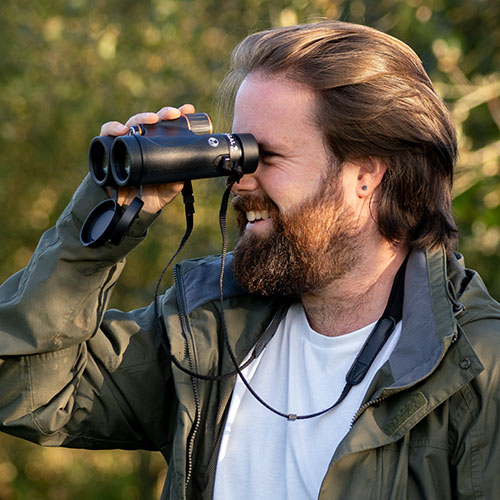
Jase Parnell-Brookes is the Managing Editor for e-commerce for Space and Live Science. Previously the Channel Editor for Cameras and Skywatching at Space, Jase has been an editor and contributing expert across a wide range of publications since 2010. Based in the UK, they are also an award-winning photographer and educator winning the Gold Prize award in the Nikon Photo Contest 2018/19 and named Digital Photographer of the Year in 2014. After completing their Masters degree in 2011 and qualifying as a teacher in 2012, Jase has spent the last two decades studying and working in photography and publishing in multiple areas, and specializes in low light optics and camera systems.
- Chris McMullenContributing Writer
- Harry BennettE-commerce Staff Writer
